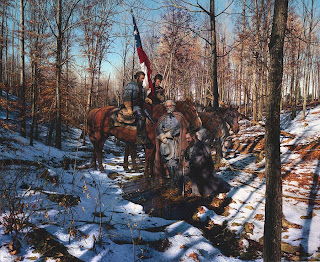
Immediately across the Potomac River from Coltons Point three prominent figures in American history were born, George Washington, John Adams and Robert E. Lee. Two have been well recognized for their contributions to the nation, Presidents Washington and Adams, but Robert E. Lee, because of the Civil War, has never got his just acknowledgment. It is time to correct this oversight by naming a national holiday for Robert E. Lee. Perhaps Memorial Day or Veterans Day could be named Robert E. Lee day in recognition of the military that has served all of America.
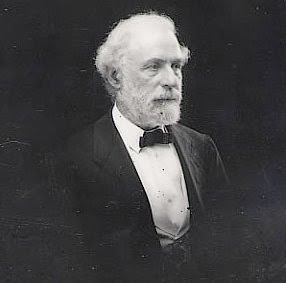
Today the Coltons Point Times is calling for this honor. Though the idol of the South to this day, Lee’s contributions were of benefit to both sides of the conflict. Lee was the son of a Revolutionary War hero Harry Lee and he finished at the top of his class at West Point. He fought, was wounded and received honors for the United States in the Mexican War and became Superintendent of West Point in 1852. He rejoined the 2nd Calvary in 1855 and served in Texas. In 1859 he was called upon to lead the marines in putting an end to John Brown’s Harpers Ferry raid. He returned to serve in Texas until summoned to Washington in 1861.
General Robert E Lee exemplified the idea of an American Southern gentleman, being intelligent, loyal, chivalrous, noble, humble and kind. He idolized George Washington who so represented the American Revolution. While he was stationed at Fort Monroe, he married Mary Anna Randolph Custis (1808–1873), the great-granddaughter of Martha Washington, at Arlington House, her parents' home just across from Washington, D.C. The 3rd U.S. Artillery served as honor guard at the marriage. They eventually had seven children, three boys and four girls.
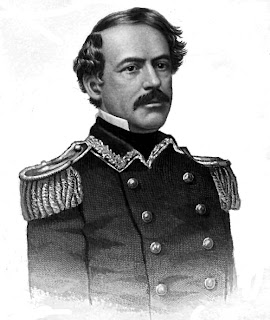
Lee ended up symbolizing the Confederate war effort in the American Civil War, and becoming an icon for not only his gentlemanly attitude but also his clever tactics and intelligence in military matters. He was a man who loved the US Constitution and the Union, and neither particularly liked, nor deplored slavery. Nevertheless, Lee served in the Confederacy, as he was loyal to his friends and family in Virginia. In fact, the land where Arlington National Cemetery, where many Union men are buried, now is, belonged to Lee. His property was seized by the Union early in the war to protect Washington, DC.
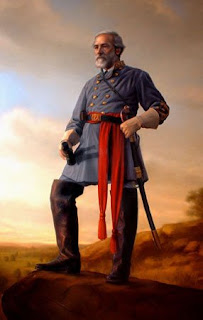
What a cruel thing is war...to fill our hearts with hatred instead of love for our neighbors, and to devastate the fair face of this beautiful world.
--Robert E. Lee
"But perhaps his greatest moments came after the war, when he worked very hard to reconcile a country that was still deeply divided after a bitter internal conflict," said S. Waite Rawls III.
"But perhaps his greatest moments came after the war, when he worked very hard to reconcile a country that was still deeply divided after a bitter internal conflict," said S. Waite Rawls III.
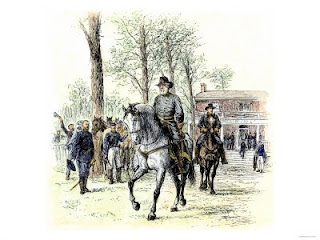
In early 1861 Lee opposed the formation of the Confederacy and considered acceptance of an offer from newly elected President Abraham Lincoln for a senior command in the U.S. Army. However, when Virginia seceded from the Union in April he chose to remain loyal to his home state. After guiding the South through several years of brilliant military strategy and nearly defeating the North Lee was named Commander in Chief of the Confederate Army on January 23, 1865 and his defense of Richmond and Petersburg against Grant before surrendering at Appomattox to the North were legendary defensive campaigns.
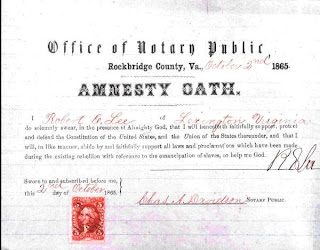
Lee returned to Richmond as a paroled prisoner of war, and submitted with the utmost composure to an altered destiny. He devoted the rest of his life to setting an example of conduct for other thousands of ex-Confederates. He refused a number of offers which would have secured substantial means for his family. Instead, he assumed the presidency of Washington College (now Washington and Lee University) in Lexington, Virginia, and his reputation revitalized the school after the war.
Lee's enormous wartime prestige, both in the North and South, and the devotion inspired by his unconscious symbolism of the "Lost Cause" made his a legendary figure even before his death. He died on October 12 1870, of heart disease which had plagued him since the spring of 1863, at Lexington, Va. and is buried there. Somehow, his application for restoration of citizenship was mislaid, and it was not until the 1970's that it was found and granted.
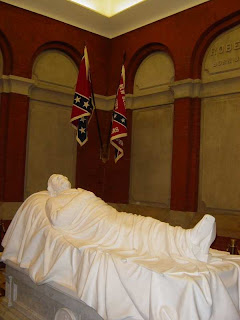
Honored for his service to both the North and South, offered the command of both the North and South, and later President of Washington and Lee University, Robert E. Lee was a soldiers soldier. He was the epitome of the American military hero.
No comments:
Post a Comment